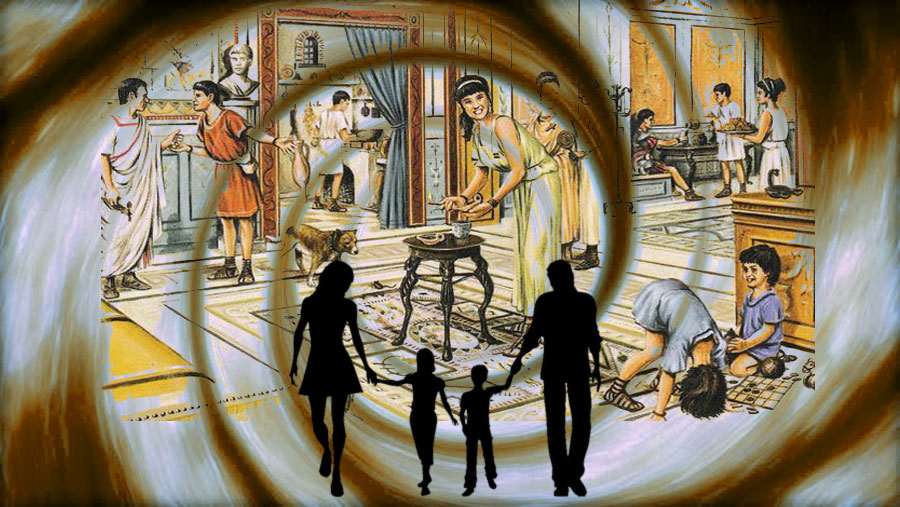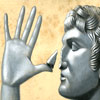Karmic Family Entanglements
 by Gina Cerminara
by Gina Cerminara
Among the multitude of sorrows that befall men and women is the anguish of having brought into the world a defective child. Materially, it is a problem in extra care and expense; socially, it constitutes a kind of unspoken stigma; spiritually, it is a source of questioning the ways of God to men, and of deep anxiety for the welfare of the child.
To such parents the reincarnation principle can be a source of reassurance and courage. In the first place, it is evident on this principle that any abnormality is probably of karmic origin. There are a few instances in the Cayce files where a birth injury was pronounced to be non-karmic, but on the whole, birth deformities are highly indicative of some past life transgression. Secondly, the connection between parent and afflicted child is almost always of karmic origin also. Again and again, in readings taken on children suffering with mongolian idiocy, deafness, water on the brain, and many other tragic afflictions, one finds the phrase: “This is karma, for both the parent and the child.”
One of the most striking examples of this type of karmic bond is to be seen in the case of a Jewish girl of twelve who had suffered since early childhood with epilepsy—an affliction which is not only embarrassing at the time of seizure, but also productive of a deep-seated personality blight. According to the reading, this family triad of father, mother, and child was previously associated together in America at the time of the Revolution, in exactly the same relationship. The parents found it financially advantageous to throw in their lot with the Colonists, and they made it their concern to gather information that would be of value to the Crown. The daughter was beautiful; she was reckless; she was clever. Such talents in combination were very convenient to the purposes of the parents; instead of restraining her, they prompted the daughter to turn her natural instincts for enticement to profitable political use.
Although the reading does not tell what the end of this singularly interesting drama was, it points out the consequences in the present lifetime; and we are led to reflect, in considering them, that if the mills of the gods grind slowly, they grind exceeding small. The life reading on the girl begins:
The parents of this entity should parallel their past experiences through their own life readings in order to discover their opportunities and their obligations toward her.
Each soul who sees the present hardships of this entity should realize that indeed each soul meets itself; and God is not mocked; and whatever a soul sows, that shall it reap.
For the self-aggrandizements and self-indulgences of the the past now find their expression in a physical condition of one who is reaping its own whirlwind . . .
Those who are now responsible for the entrance of the entity into this material plane were those who were then largely responsible for her failure to exercise due self-control, and, in fact, they allowed it for the sake of greater material gains. Consequently, they too are meeting in the present much that may be overcome in this experience.
In short, the daughter is meeting her former indiscretions of sexual excess in her present physical affliction. It is only fitting that the parents be charged with the care of one for whose waywardness they were largely responsible.
A second interesting case is that of a New York girl who was born blind. This little girl—an attractive child, to judge by her photographs—had some light sensitivity, but was unable to distinguish the forms of objects. A physical reading was requested by the mother; but as no life reading was taken on the child, we do not know the karmic cause of her affliction. However, the mother obtained a life reading on herself, and the reason for her obligation to the child was made clear.
It appears that the mother had been a teacher in her past life. And, to quote the reading, “the entity took advantage of a situation that brought turmoil to a mother. And though the entity rose to a place in the hearts and minds of many—man looks on the outward appearance; God looks on the heart. In this present affliction you and your husband are meeting your own selves. For you once placed selfish purposes before God’s laws.”
We can only conjecture as to the exact nature of this dramatic intrigue, in which it would seem that the father was also involved. All that we know specifically is that a teacher exploited a mother to her own self-interest and at the expense of the mother’s peace of mind. It seems likely that there are two distinct streams of destiny here. The woman who was exploited had herself some physical karma to meet in the form of blindness, probably from some antecedent life. The present life was selected for its expiation; and the present mother was chosen as the channel of entrance in order to be given an opportunity to meet her own personal karmic obligation.
A third interesting case is one of mongolian idiocy. Here again very little detail is supplied, but it seems clear that the mother’s mockery of afflicted persons during an incarnation in Palestine was the karmic cause of attracting a defective child to herself in the present.
Another case concerns a premature infant born with the uncommon affliction known as “waterhead.” The mother died a few days after having given birth, and the young, widower father placed the child in a Catholic home. When she was four years old he requested a physical reading on her. He writes: “She is very intelligent, understands everything, knows people by name, and can carry on a fairly nice conversation. She cannot walk, because of the weight of her head, and she must be careful how she holds it.”
No life reading was taken on the little girl, and therefore there is no indication of the karmic nature of her affliction. However, the father had a life reading on himself in which he asked his previous relationship to the child. The answer was briefly and sharply: “In the experience before this you could have helped and you didn’t. You’d better help in the present.” Unfortunately, there is not sufficient data in the body of the reading to establish the exact nature of his sin of omission. All we know of his last life is that he was a trader in Fort Dearborn, and that he “gained mentally and materially, and lost spiritually.”
One inference suggests itself very strongly in connection with this case—namely, that indifference to human suffering causes destiny to place it upon our doorstep. A human being may not be so callous as to commit a positive act of cruelty against another; yet he may be, like the souls whom Dante puts in Limbo, no more actively good than he is actively bad. Such an attitude in the presence of pain is not, perhaps, sufficiently active a sin to result in future physical deformity of his own. But he must somehow learn concern for the afflicted ones of the earth; he must, in short, develop sympathy. And what better means could there be, since he himself does not merit affliction, than that he should become the parent of an afflicted child. Through the agony of watching the helpless ineptitude of his own offspring, he is given the opportunity to understand the agony of parents of afflicted ones, and the meaning of human pain.
If after two successively more intimate opportunities to learn active charity he still remains indifferent, possibly the sin of omission will have assumed large enough proportions to generate affliction within his own body—and in the next life he may be born in some way afflicted himself. Such a sequence of events is nowhere stated explicitly in the readings, but it is strongly suggested in this and many other instances.
Cases such as the ones cited above show how karmic debts exist between parent and child; there can also be bonds of a karmic nature between child and child of the same family. In the Cayce files a curious case of sister-sister antagonism illustrates this point.
The relationship of the two girls in point had been marked since early childhood by jealousy, suspicion, and hate; quarrels flared continually between them, and on the slightest provocation. No such antagonism existed among the other brothers and sisters in this family of five children. From the Freudian point of view, the hostility between the two sisters would perhaps be explained on the basis of some infantile jealousy for the possession of the father. According to the Cayce clairvoyance, there was, as a matter of fact, deep-seated jealousy of a sexual nature on the part of one of the two women; but it was occasioned not by the present-life father, but rather by the past-life husband of the older girl.
In order to keep the personages of this rather complicated relationship clear, we had better give names to the three persons concerned, in their present-life relationship: Lou is the younger sister; Alice, the older sister; and Tom, the husband of Lou. When Lou asked in her life reading for an explanation of her previous relationship to her husband and sister (with both of whom she was having difficulties at the time) she was told of the following little drama.
The three had known each other well in the late Colonial period in Virginia. Tom was then the husband of Alice, Lou a sort of mothering angel in the community, had nursed Tom back to health at a time when his wife was for some unspecified reason separated from him. Lou’s motives had been purely those of a sister of charity, but her kindness established a bond of understanding between herself and Tom which Alice resented bitterly when she discovered it. The unfounded resentment and jealousy soon developed into hate; and these corroding emotions cut so deep in the psyche of the embittered woman as to remain there even after the passage of centuries.
Rationally speaking, there was no need for Alice in the present life to hate her younger sister or to bully her. But deep in the unconscious recesses of her mind was the pattern of hatred. And in Lou, all the mechanisms of defense and retaliation were alerted by the unconscious also. Unwittingly they began to reenact the emotional drama of the past; unconsciously they became embattled females because once before they had had apparent reason for battle.
A second case of sibling bonds of a karmic nature concerns two English-born children who, during World War II, were cared for by an American woman who at the time was directing her own progressive school in a New England state. The boy was ten, the girl five, at the time of adoption. Their guardian, who was familiar with child psychology, both academically and through a lifetime of practical experience in educating children, became concerned over the marked hostility between the brother and sister. Apparently the brother was the principal aggressor. “He is extremely bright,” the woman wrote in one of her letters, “but such a pathetic child—like a dog at bay, and using Nazi methods.” She asked for a life reading on both children.
The reading disclosed the highly interesting fact that the two children were formerly members of opposing clans in an old and fiercely fought Scottish feud. Here again the animosity persisted like an undercurrent to the stream of consciousness, such that several centuries later the current of hate was still so strong as to give rise to antagonism between a ten-year-old boy and a five-year-old girl.
These two instances are sufficient to illustrate the principle involved, and to suggest both to individuals tortured by inexplicable animosities between themselves and their siblings, and to analysts confronted by such problems among their clients, a possible source of the difficulty. To be sure, there is good reason in any family for antagonism among members merely on the basis of contemporary irritations. The chemistry of temperament is such that incompatible elements which would merely be sources of indifference or mild dislike in casual encounters become insufferable and even explosive when in the crucible of intimate family life.
The critic of the reincarnationist view might point to this fact on one side and to the Law of Parsimony (“The simplest explanation is the best”) on the other, saying that there is no necessity for postulating reincarnation to explain family hatreds when the facts are well explained as they now stand. To this objection most reincarnationists would fully agree were it not for their loss of faith in the Law of Parsimony as commonly interpreted. It undoubtedly serves and has served a useful purpose in keeping man’s speculations about the universe in sobering restraint; but the expanded vision of the universe afforded by new discoveries in science, let alone the theoretical horizons of the reincarnationist principle, throws a glaring searchlight on the assumption that the “simplest” explanation must be correct, and shows that it may be a revelation of the simplicity of man’s mind rather than an accurate reference to the simplicity of operations of the universe. What is now conceived to be “simple” may in the light of new facts prove to be merely fragmentary.
If the general reasonability of the whole reincarnation principle is accepted, the arguable details fall naturally into place. Though contemporary reason admittedly can be found for any antagonism between human beings, it is at the same time conceivable that the basis for the antagonism was laid many centuries ago.
It must be remembered, of course, that the uncovering of a past life cause for antagonism does not of itself dissolve it. If the partners in the yoke of hatred do not wish to remain harnessed together, life after life, they must make a conscious, deliberate, and patient attempt to substitute love for hate, and kindness for animosity.
This admonition holds true not only of antagonisms that occur between members of the same family; it holds true of all antagonisms and all situational ties that bind us with individuals anywhere. In the last analysis, the constant transposition of role which we experience with regard to the family should show us that we are members, in ultimate reality, of no single family. We are members, rather, of the one great family of the human race; we should learn to live constantly in the awareness of that truth.
Excerpt from Many Mansions
Posted in Other Topics, Reincarnationwith comments disabled.





